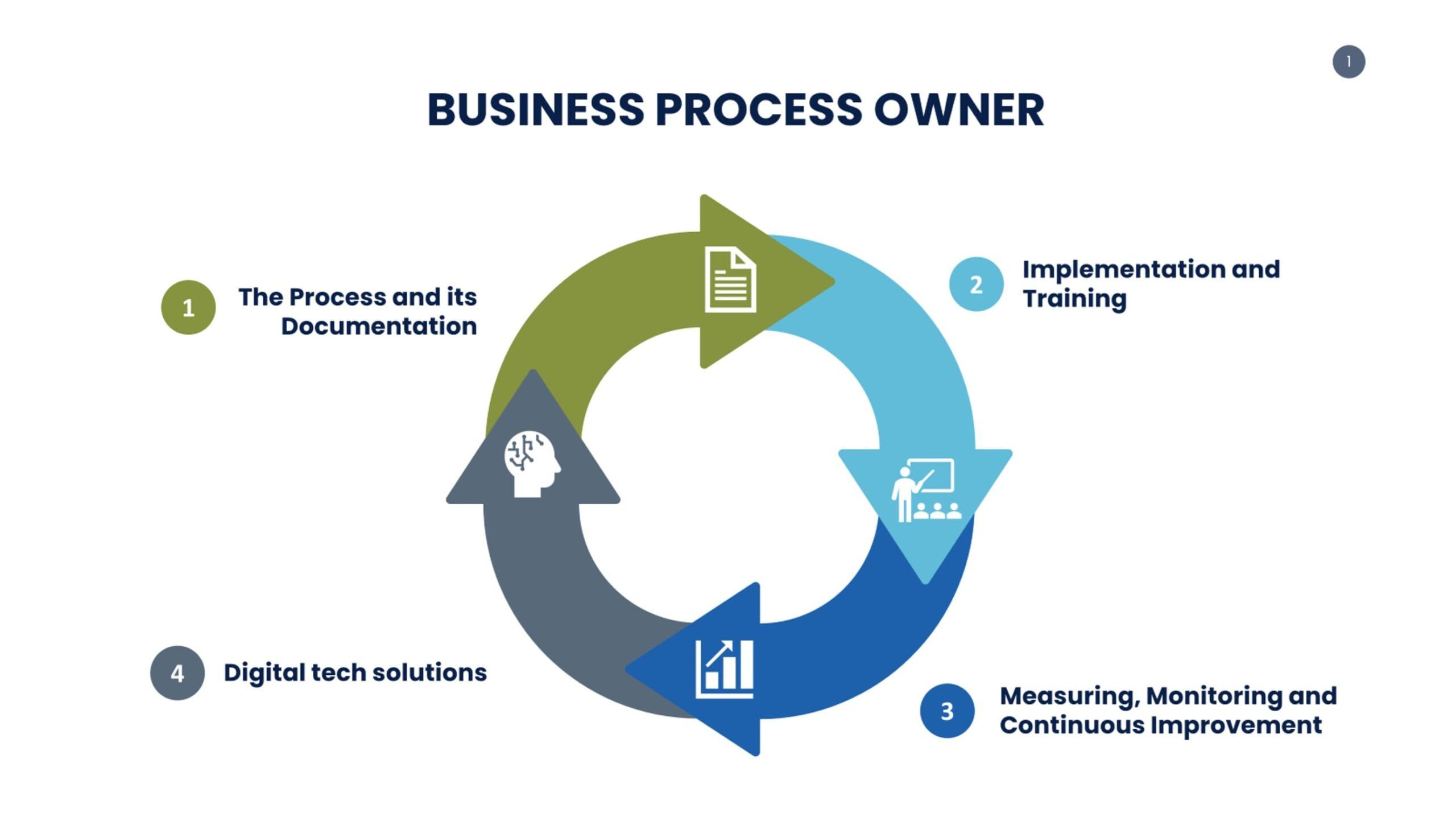PART 1: The Importance and Complexity of the Business Process Owner Role
In recent years, the pharmaceutical industry has made substantial efforts to enhance understanding and define the role of the Business Process Owner (BPO) within the Quality Management System (QMS).
This role is crucial and closely related to the more general role of the Business Process Owner (BPO) who is the individual within an organization responsible for the overall business use of a process/system. While key responsibilities are undoubtedly the same, the QMS BPO has its own compass pointing to the strictly regulated environment of the pharmaceutical industry. The QMS BPO is focused on ensuring compliance with applicable quality standards and regulations, when meeting the needs of the business and its stakeholders.
Nevertheless, and irrespective of the key difference, both roles are vital for any organization striving to optimize processes and reach operational excellence.
The Role of BPO Within the QMS
In brief, the QMS BPO is a person within an organization responsible for developing, implementing, and maintaining a specific process within the QMS. The QMS BPO is responsible for ensuring that the owned process is compliant with the relevant quality standards and applicable regulations and that is adequate, effective, and efficient, and aligned with the organization’s overall goals and strategy.
Said like this it seems straightforward, however there is much more to it and reaching clarity on the responsibilities of the QMS BPO and how these responsibilities are fulfilled, helps organizations uncovering gaps in process measuring and monitoring and therefore in gathering evidence on suitability and effectiveness of the QMS that would then drive opportunities for continuous improvement.
Let us deep dive into the QMS BPO’s principal areas of activity and associated responsibilities.
The Owned Process and its Documentation
The QMS BPO is responsible for designing the owned process in compliance with company policies and applicable regulations. To achieve this, it is crucial that the QMS BPO has the relevant expertise about the process and that he/she/they are skilled in creating and managing a network of subject matter experts (SMEs) – preferably both within and outside the organization – and End Users that will provide inputs into the development and continuous improvement of the owned process ensuring enterprise-wide consistency and optimization.
It is important that the QMS BPO defines each role in the owned process and the competencies required by the role. This facilitates identifying employees who are already qualified for the role or developing employees for these roles.
The QMS BPO should also connect with the process owners of upstream, downstream, and interlinked processes to ensure that interactions and handover points are agreed upon and consistently described across the different processes.
Finally, the QMS BPO is responsible for authoring, in close collaboration with SMEs, the associated documentation such as standard operating procedures (SOPs), handbooks, forms, and any next revision.
Implementation and Training
As part of the development of the process and forward-looking to its implementation, it is crucial that the QMS BPO determines the training requirements, best would be meeting the needs of different learner personas, and creates the associated training material or, better, where there is a learning function within the organization or where learning is outsourced, provides the content for the learning material, its review and approval.
Facilitating the understanding of the owned process requirements through an impactful learning experience but also through webinars, walk-throughs, Q&A sessions and providing support to end-users are key tasks to successfully implement the owned process and any next improvement across the organization.
Three to six months after implementation, process verification through Gemba would enable determining if the process objectives are met and expected benefits delivered. This ensures that the organization’s resources are being used effectively and efficiently to achieve the process objectives.
Measuring, Monitoring and Continuous Improvement
As the process is in use within the organization, measuring and monitoring its suitability and effectiveness and continuous improvement are the QMS BPO’s core activities.
As part of the development of the process and in line with company strategic priorities, it is essential that the QMS BPO defines, in alignment with stakeholders and end users, suitable measures and monitoring to gather evidence that the process meets its objectives, to evaluate suitability and effectiveness, and act where there are adverse trends and/or signals.
Much as Cp charts, visual displays of QMS measures in operational areas can also motivate employees and increase their engagement with the QMS. Seeing trends in a chart can be more impactful than just seeing the raw numbers, and it can encourage employees to participate more fully in improvement efforts.
Risks and opportunities with the current process should also be identified and periodically reviewed to determine where action is required.
Implementation of a Community of Practice (CoP) for the owned process would be instrumental not only in maintaining and sharing knowledge but also in providing a platform where to discuss risk and opportunities and to share methodologies, techniques, and tools that have been found effective in specific scenarios, for broader consideration.
Periodically presenting the evaluation of process performance and the current state of improvement and opportunities to leadership ensures senior management maintains oversight of the effectiveness of the QMS.
Digital Tech Solutions
Here is a longstanding and thorny question: should the QMS BPO also own the digital tech solution supporting the process?
The true response is ‘it depends’, and specifically, it depends on the capability of the QMS BPO and the size of the organization. However, it is rare to find talents that have both the expertise in the process from an operational and compliance perspective and the competencies required nowadays for the agile development of a digital product.
So, it is more likely and advisable that the QMS BPO works in partnership with a Product/System Owner, typically a member of the IT team, who has a similar role to the QMS BPO with regards to a digital tech solution supporting a process, which means representing the interests of the stakeholders and end users, being responsible for making decisions about the features and requirements of the product and accountable for its overall success.
Nevertheless, the QMS BPO retains the responsibility to define, in collaboration with SMEs and end users’ networks, the user requirements specification (URS) of the computerized system (CS) supporting the owned process and, where necessary, to build the business case for acquiring or in-house developing a CS to support the owned process. The QMS BPO then transfers URS to the Product Owner and coordinates the SMEs’ and end users’ testing of the system. Serving as a reviewer of the computerized system validation (CSV) documentation is also a crucial responsibility.
Is that all? Understanding the responsibilities of a sound QMS BPO would really help organizations uncover gaps that would then drive opportunities for continuous improvement.
It is indeed a great place to start; however, responding to the next question, ‘What should an organization look for when assigning the role of Business Process Owner?’ will further help in understanding the competencies and skills that would make a QMS BPO successful in fulfilling their responsibilities. We will talk about these in PART 2 of this article.
Conclusion
In summary, developing, maintaining, and continuously improving owned processes are essential for ensuring compliance with company policies and regulations. Creating a network of SMEs and end users, authoring associated documents, determining training requirements, monitoring performance, identifying risks and opportunities, and collaborating on computerized system development and validation are all key responsibilities of a QMS BPO that working in synergy ensures senior management maintains oversight of the effectiveness of the QMS.
Our forthcoming Part II of this article illuminates the competencies and skills essential for a QMS BPO to effectively fulfill their role. Stay tuned for expert insights!
Image credit:
Image by <a href=”https://www.freepik.com/free-photo/abstract-networking-concept-still-life-arrangement_16234496.htm#query=thread%20coneecting&position=8&from_view=search&track=ais&uuid=8b8b7cfa-7e8c-4ce9-bb61-13c9b9db4c9d”>Freepik</a>
KVALITO is a strategic partner, global quality and compliance service, and network for regulated industries. To find out more, please visit us at www.kvalito.ch. If you want to benefit from KVALITO’s expert services, please email us at contact@kvalito.ch. Are you looking for an exciting and challenging position as a consultant, or are you an ambitious student/graduate looking for an internship? Please send your complete application to recruiting@kvalito.ch.





